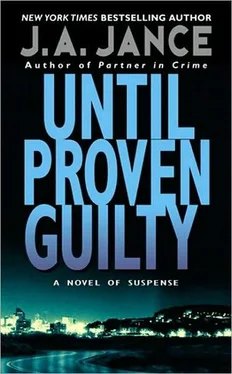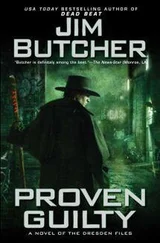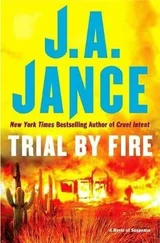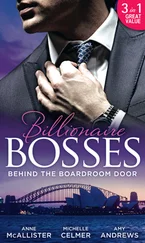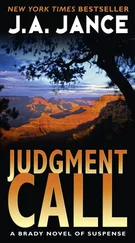J. Jance - Until Proven Guilty
Здесь есть возможность читать онлайн «J. Jance - Until Proven Guilty» весь текст электронной книги совершенно бесплатно (целиком полную версию без сокращений). В некоторых случаях можно слушать аудио, скачать через торрент в формате fb2 и присутствует краткое содержание. Жанр: Детектив, на английском языке. Описание произведения, (предисловие) а так же отзывы посетителей доступны на портале библиотеки ЛибКат.
- Название:Until Proven Guilty
- Автор:
- Жанр:
- Год:неизвестен
- ISBN:нет данных
- Рейтинг книги:4 / 5. Голосов: 1
-
Избранное:Добавить в избранное
- Отзывы:
-
Ваша оценка:
- 80
- 1
- 2
- 3
- 4
- 5
Until Proven Guilty: краткое содержание, описание и аннотация
Предлагаем к чтению аннотацию, описание, краткое содержание или предисловие (зависит от того, что написал сам автор книги «Until Proven Guilty»). Если вы не нашли необходимую информацию о книге — напишите в комментариях, мы постараемся отыскать её.
Until Proven Guilty — читать онлайн бесплатно полную книгу (весь текст) целиком
Ниже представлен текст книги, разбитый по страницам. Система сохранения места последней прочитанной страницы, позволяет с удобством читать онлайн бесплатно книгу «Until Proven Guilty», без необходимости каждый раз заново искать на чём Вы остановились. Поставьте закладку, и сможете в любой момент перейти на страницу, на которой закончили чтение.
Интервал:
Закладка:
When the tour was over, Brodie ushered us back to the Penitent’s Room in the best bum’s-rush tradition. “ I need to go outside to greet people now,” he said. “Once the service starts, you will have to leave.” He gave a rueful smile lest we think him rude or inhospitable. “It’s like a Mormon temple. No one who isn’t a True Believer is allowed inside during services.”
The lady with the scrub brush was kneeling in front of the little altar in the Penitent’s Room, her bucket of soapy water still beside her. She was totally immersed in prayer. We stopped nearby but she never looked up. We went back through the sanctuary under our own steam.
Outside, a little flock of True Believers waited patiently for their shepherd to welcome them to worship. The women, their hair covered with either scarves or hats of some kind, dropped their eyes demurely as we passed. The men nodded without speaking, while the children maintained the same eerie silence we had noticed the day Angel Barstogi died. It was not a joyful gathering.
Jeremiah stood next to a beefy man with a full red beard. He had to be Benjamin Mason. He was a big man who looked like he had spent some time on the working end of a shovel. I walked up to Jeremiah and nodded at him without speaking. There was no sense in getting him in more hot water.
“Are you Mr. Mason?” I asked.
“Yes,” he answered, his tone wary, uneasy.
“I’m Detective Beaumont. Did you get a message to call me?”
“Didn’t have a phone,” he mumbled.
“Mind if we talk to you for a minute?” Reluctantly, he followed us to our car. I thumbed through some notes I’d made from the transcripts. “Brodie says you were working Friday morning?”
He nodded. “That’s right.”
“And you do yard work. Can you give us a list of places you worked Friday morning?”
“Wait just a minute.” Suddenly he came to life. “You’ve got no right—”
Peters’ hand shot out, catching Mason’s arm just above the elbow. “You wait a minute, pal. He asked you a civil question. You can answer it here, or we can take you downtown.”
“Viewmont,” he said. “I was working some houses up at the north end of Viewmont over on Magnolia.”
“Anybody see you?”
“Dunno. Usually nobody’s home.” He mumbled the addresses and I wrote them down.
“Got any I.D. on you?”
His hand shook as he fumbled his wallet out of his hip pocket. When he dragged the battered piece of plastic out of its holder, the license turned out to be an Illinois one, several years out of date. The name on it was C. D. Jason. I felt a jab of excitement.
“What’s the C stand for?” I asked.
“Clinton,” he answered shortly.
Not Charles, not Chuck, not Charlie, but Clinton. The picture matched, but the names were different. Peters took it from me and examined it. He put it in his pocket. “We’ll just take this with us,” he said easily.
“But I need it to drive,” Mason protested, reaching for it.
“You’d best get yourself a Washington license. Meantime, what did you do to the backs of your hands?”
Mason withdrew his hands and stuffed them in his pockets. Not before I noticed that the backs matched Brodie’s, scratch for scratch.
“Let me guess,” Peters said. “I’ll bet you got those scratches trimming hedges.”
“That’s right,” Mason said. “How’d you know that?”
“Psychic,” Peters replied.
Mason or whoever he was scurried into the church like a scared rabbit. Peters said nothing until Mason was out of earshot. He turned to look at the church. “I’d love to get a stick of dynamite and blow this whole pile of shit to kingdom come.”
“You’d best not let Powell hear you talk like that. Powell might be looking for an excuse to bust you back to the gang.”
Peters gave me a searching look. “You know something I don’t know?”
“I don’t know anything. I have a suspicious nature.”
We spent a couple of hours touring arterials, collecting sample packets of mustard from every fast-food joint we could find that seemed to be within a reasonably close geographical area. It would be strictly blind luck if we happened to get a match, but that sort of thing does happen occasionally. I believe the psychologists call it intermittent reinforcement. It’s what keeps bloodhounds like me on the trail. Every once in a while we hit the jackpot. It happens often enough that it keeps us from giving up. We just keep at it.
We carried a picture of Angela Barstogi with us, the one that had been in the newspaper. We asked all the clerks, all the busboys, if anyone remembered a little girl in a pink Holly Hobbie gown. Nobody did.
With the mustard sacked and labeled, we drove over to the Westside Treatment Center. The receptionist was off for the weekend, but we managed to get a list of employees, their schedules, and their phone numbers from a supervisor. We spent the remainder of the afternoon on telephones working our way through the list to no avail. It wasn’t that people were uncooperative or reluctant to help. It was just that no one had seen anything. We finally called it a day around seven Saturday night. We were getting nowhere fast.
Peters offered to drive me over to Kirkland and back, to take me to a wonderful health food restaurant he knew. I appreciated the offer, but I was beat. I wanted to be home in my own little apartment with my own little stereo and my own little self. “I’ll take a rain check,” I told him.
I declined the offer of a ride, too. I didn’t want Peters to know that I was going to stop and pick up a Big Mac and an order of fries at the McDonald’s at Third and Pine. He had made enough sarcastic remarks about junk food while we were gathering the mustard. I wasn’t about to let him know that I am a regular customer at the local Big Mac outlet, that the clerks know me by name and order. It’s not that I’m ashamed. It’s just that I didn’t want to give Peters any more ammunition.
As I stood waiting for my order, I looked around at the stray slice of humanity sitting in those four walls munching Big Macs. There was a genuine bag lady with her multilayered coats. There was a group of young toughs arguing loudly in one corner. In another a couple of long-legged hookers daintily dipped Chicken McNuggets under the watchful eye of a well-dressed pimp.
The clerks took the orders and the money, shoving the food back across the counter with studied disinterest. It was business as usual as far as they were concerned. With all the weirdos hanging around, it was hardly surprising no one had noticed a kid in a nightgown eating a hamburger for breakfast at eight o’clock in the morning.
I went home and let myself into the peace and quiet of my apartment. I mixed myself a generous MacNaughton’s. Then I set the table with a place mat and a matching linen napkin. I may like McDonald’s, but I won’t eat on paper plates in my own home, either. I arranged the hamburger and fries tastefully on the brown-bordered stoneware plate the decorator had assured me was very chic and very masculine. Then I dragged a Tupperware container of radishes and celery out of the fridge.
Those mealtime amenities may seem silly at times, but for three months after I moved out of the house, I ate on nothing but paper plates with plastic forks, knives, and spoons. I was sure Karen would come to her senses and take me back. I was living in a world of miserable, not blissful, ignorance. I kept thinking Karen had divorced me on my own merits, believed that what she said about being a cop’s wife was the truth. I hadn’t known about the accountant then, the accountant for an egg conglomerate who had come to town looking for an egg-ranch site near Kent or Puyallup. I hadn’t known this jerk had walked into the real estate office where Karen had just started working and swept her off her feet.
Читать дальшеИнтервал:
Закладка:
Похожие книги на «Until Proven Guilty»
Представляем Вашему вниманию похожие книги на «Until Proven Guilty» списком для выбора. Мы отобрали схожую по названию и смыслу литературу в надежде предоставить читателям больше вариантов отыскать новые, интересные, ещё непрочитанные произведения.
Обсуждение, отзывы о книге «Until Proven Guilty» и просто собственные мнения читателей. Оставьте ваши комментарии, напишите, что Вы думаете о произведении, его смысле или главных героях. Укажите что конкретно понравилось, а что нет, и почему Вы так считаете.
